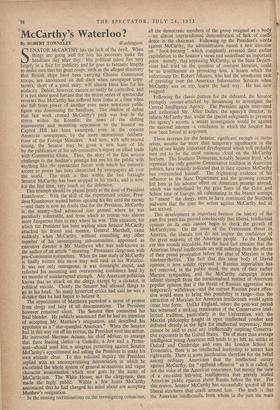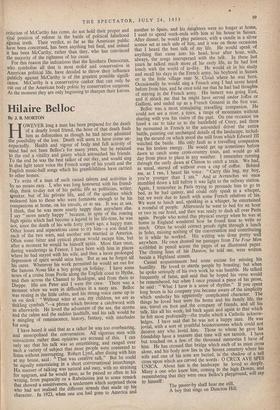'WIcCarthy's Waterloo?
SENATOR McCARTHY has the luck of the devil. When things are going well for him his successes make the headlines day after day. His political talent lies very largely in a flair for publicity and he goes to fantastic lengths to make sure that his great coups, such as the alleged discovery that British ships have been carrying Chinese Communist troops, are announced on dull days when newspaper copy- tasters, short of a good story, will almost bless him for his audacity. Defeat, however, cannot so easily be controlled, and it is just sheer good fortune that the recent series of spectacular reverses that McCarthy has suffered have come at a time when the fall from , power of another even more notorious public figure was dominating the headlines. The shadow of defeat that last week crossed McCarthy's path was lost in the storm within the Kremlin; the news of the shifting manoeuvres and mounting opposition to the Senator on Capitol Hill has been swamped, even in the copious American newspapers, by the more momentous delibera- tions of the Foreign Ministers. And now, with split-second timing, the Senator may be given a new lease of life by the publication of his sub-committee's report on allied trade with Communist China. ,Thus, the story of the first serious challenge to the Senator's prestige has not hit the public with anything like the spectacular furore with which his meteoric ascent to power has been chronicled by newspapers all over the world. The truth is that within the last fortnight Senator McCarthy has been stopped in his tracks, and is now, for the first time, very much on the defensive. This triumph should be placed firmly at the door of President Eisenhower. With the skill of the experienced soldier, Presi- dent Eisenhower waited before opening his fire until the enemy —and there is now no doubt that for the President, McCarthy is the enemy—had advanced into ground where he was peculiarly vulnerable, and from which to retreat was almost more dangerous than to stay where he was. This situation, for which the President has been waiting since Senator McCarthy attacked his friend and mentor, General Marshall, came suddenly when McCarthy, without consulting any other member of his investigating sub-committee, appointed as executive director a Mr. Matthews who was well-known as the author of an article " smearing " Protestant clergymen with pro-Communist sympathies. When the case study of McCarthy is finally written this move may well rank as his Waterloo. It was not only outrageous; it was downright stupid, and reflected his mounting and overweening confidence bred by six months of uninterrupted triumph. " Any American politician knows that an attack on the clergy, except by a dictator, is political suicide. Clearly the Senator had allowed things to go to his head. So many hysterical critics had said he was a dictator that he had begun to believe it.
The appointment of Matthews provoked a storm of protest from clergy and laity of all denominations. The President however remained silent. The Senator then committed his final blunder. He publicly announced that he had no intention of accepting Mr. Matthew's resignation, and described. his appointee as a " star-spangled American." When the Senator had in this way cut off his retreat, the President went into action. He instructed Sherman Adams, his chief adviser, to arrange that three leading clerics—a Catholic, a Jew and a Protes- tant—should send him a telegram protesting against Senator McCarthy's appointment and asking the President to make his own attitude clear. To this solicited inquiry the President replied with an uncompromising denunciation in which he excoriated the whole system of general accusations and vague character assassination which now goes by the name of McCarthyism. The White House, not the clergymen, then made the reply public. Within a few hours McCarthy announced that he had changed his mind about not accepting Matthew's resignation.
In the ensuing recriminations on the investigating committee, all the democratic members of the group resigned as a body —an almost unprecedented demonstration of lack of con& dence in the chairman. Following up the President's words against McCarthy, the administration issued a new directive on " book-burning " which completely reversed their earlier capitulation to the Senator's views and underlined an important point—namely, that appeasing McCarthy, as the State Depart- ment had tried on the question of overseas libraries, could be as troublesome as provoking him, a lesson which the unfortunate Dr. Robert Johnson, who had the unwelcome task of presiding over the American Information Services when McCarthy was on top, learnt the hard way. He has now resigned.
Following the classic pattern for the defeated, the Senator promptly counter-attacked by threatening to investigate the Central Intelligence Agency. The President again intervened and authorised Mr. Allen Dulles, the agency's director, to inform McCarthy that, under the special safeguards to preserve. the agenCy's secrets, a senate investigation would be against the national interest—a conclusion in which the Senator has now been forced to acquiesce.
These reverses for the Senator, significant enough in them- selves, assume far more than temporary significance in the light of one highly important development which will probably turn out to be the most ominous cloud on the McCarthy horizon. The Southern Democrats, notably Senator Byrd, who represent the only genuine Conservative tradition in American politics, have recently indicated that in their opinion McCarthy has overreached himself. The frightening evidence of his influence in the State Department and the growing concerti felt here at his adverse effect on American prestige abroad, which was underlined by the grim farce of the Cohn and Schine tour of Europe, all culminating in the brazen attempt to " smear " the clergy, seem to have convinced the Southern stalwarts that the time for action against McCarthy had at last arrived.
This development is important because the history of the past five years has proved conclusively that liberal, intellectual opinion on its own cannot begin to check the growth of McCarthyism. On the issue of the Communist threat in America, the liberals just do not inspire the confidence of the great majority of the American people. To the English ear this sounds incredible, but the hard fact remains that the American liberal intellectuals are still suffering from the effects of their proud prostration before the altar of Marxism in the nineteen-thirties. The fact that this same body of liberal opinion is now solidly opposed to Russian imperialism has not removed, in the public mind, the stain of their earlier Marxist sympathies, and the McCarthy campaign draws infinite strength from the unrationalised instinct of American popular opinion that if the threat of Russian aggression was temporarily withdrawn—and the current Russian peace offen- sive would seem to bring this possibility in range—then the attraction of Marxism for American intellectuals would again come into force. Unlike England, where the post-war period has witnessed a striking renaissance of the Conservative intel, lectual tradition, particularly in the Universities, with the Marxist philosophy fought in 'open intellectual combat and defeated cleanly in the fight for intellectual supremacy, there cannot be said to exist any intellectually inspiring Conserva- tive exponents in the United States. The of more than average intelligence young American still tends to go left, as, unlike at Oxford and Cambridge and even the London School of Economics, there is' no intellectual leadership to attract him rightwards. There is some justification therefore for the belief among ordinary Americans that the intellectual outcry against McCarthy, the " egghead offensive " as it is called, is not the voice of the American conscience, but merely the view of a one-sided left-wing intelligentsia that gravely misled American public opinion about Russia before the war. For this reason, Senator McCarthy has successfully ignored all the liberal strictures than crash around him. The truth is that the American intellectuals, from whom in the past the main criticism of McCarthy has come, do not hold their, proper and vital position of referee in the battle of political falsehood against truth. Their verdict, so far as the American public have been, concerned, has been anything but final, and indeed it has been McCarthy, rather than they, who has convinced the majority of the rightness of his cause.
For this reason the indications that the Southern Democrats, who symbolise all that is most stolid and conservative in ' American political life, have decided to throw their influence publicly against. McCarthy is of the greatest possible signifi- cance. McCarthy is a conservative canker that can only be cut out of the American body politic by conservative surgeons. At the moment they are only beginning to sharpen their knives.



























 Previous page
Previous page